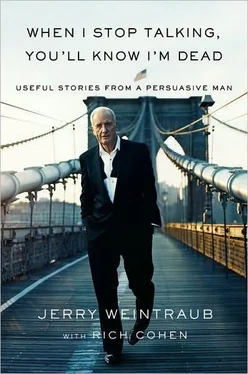"It was three hours and twelve minutes, Mr. Weintraub. Did you enjoy your conversation?"
"No, not particularly."
"Well, I listened to some of it and it was terrible. How can you talk like that?"
"You listened to my conversation?"
"I wanted to reach Mr. Stein in New York, and was trying to get on the WATS line, but they told me it was being tied up by a Mr. Weintraub."
Wasserman had probably expected me to obfuscate, bullshit, stammer, or lie, but I instead told the truth. Which disarmed him immediately and made it so he would probably never forget me. I mean, can you believe this kid?
There was a pause, then he said, "When I come to New York, I want to meet you."
A few weeks later, he called, asked me to his office. We talked, and later talked again, then again, and gradually, over time, we became friends.
By the early sixties, MCA represented the biggest names in Hollywood. The agency had a kind of monopoly on star power, which allowed Wasserman to go to the studio bosses, who had always enjoyed total control, and say, "Look, you have a choice: Either you share some of that control, or you make your films without our stars." In this way, he was able to negotiate for his clients an unheard-of degree of freedom, meaning they could choose their projects, move from studio to studio, let the market determine their fees, which meant a shift of power from management to talent and, ultimately, the breakup of the old system. Of course, this all came back to bite Wasserman later, when he turned MCA into a studio.
I learned a lot from Lew: from his rise, from how he built his agency and studio, but also from his limitations, which resulted from the very quality that made him a success-his sympathy and identification with talent. He operated close to the ground, among the actors and directors who were turning out the product, thus sometimes missed the big picture-the tracking shot-which was, after all, part of his job. The vision thing. I think that's why MCA was later taken over by Matsushita, by Seagrams. Simply put, Wasserman missed a turn in the plot. The other studios launched television networks, theme parks, diversified and grew, but did Wasserman develop an HBO or MTV? No. Sony, Paramount, Disney, Columbia -they all realized they had to get bigger to survive, but Wasserman kept MCA small. Big but small. When the game changes, you have to change with it. The more you change, the more you risk in order to survive-and it gets harder and scarier as you get older.
Not long after our first meeting, Wasserman gave me a shot. He moved me up and let me float, meaning I worked all over the company, in every department, which was a great opportunity. Why did he do this for me? Because, when the obvious thing was to lie (about the WATS line) I told the truth. That was unusual. It set me apart. It made me interesting, and interesting is valuable. I was now in a position to see how the company really worked, how the deals were really made, how a contract was negotiated, how the terms were reached, how the points were traded and the deal closed, but-here is the funny part-the more I observed, the more I realized how much I knew already. I already instinctively knew how to handle a client, how to deal with a demand, how to back off a bully, how to make everyone walk away feeling good about how bad the other guy was feeling-this was pure Bronx, street-corner stuff.
After a few years working for Wasserman, I felt I had learned all that I was going to learn and was ready to move on. Maybe it was that old restlessness again. I was tired of being a cog in another man's machine. It might seem strange to walk away from such a plum gig, a risk, but I did not feel like I was taking a risk. I was just doing what I had always done. It did not matter if it was Lew Wasserman or my father with his jewelry case. I did not want to follow another man's script. I was living my own plot, following my own light. How did I know it was time to move on? How do you know that a movie is over? The girl kisses the boy, the credits roll, you stand up and leave. I was twenty-four. I had decided to start my own business.
I told Lew I was leaving. We were in his office in New York. He came around the desk, took off his glasses. "You're doing what?"
"I'm leaving."
It was exhilarating-not quitting Lew, because I loved Lew, but taking control of my life and my career, choosing, saying, "I want to do this, not that."
That's freedom-that's all it really is.
He put his hand on my shoulder.
He said, "This is a mistake."
He said, "This is the best possible place for you."
He said, "Do you understand what kind of opportunity I have given you?"
Finally, when he saw my mind was made up, he went back around his desk, sat down, and said, "When you leave here, where do you think you're going?"
I said, "I don't know."
He said, "You mean to say you're going to quit MCA, and you don't even know where you're going?"
"Yes."
He said, "You're not as smart as I thought you were, Jerry."
Years later, after I had bought a house just up the street from Lew, some representatives of a fund-raising group came to see me. They said they wanted to honor me, throw me a dinner, blah, blah. They were flowery in their rhetoric as to me, but as you get older you come to understand the real reason you're chosen for such honors: because the committee of whatever thinks your name can sell tables. It's not you they are after, in other words, it's your address book. Five or six of them sat in the living room, explaining why I had been selected. It's you and only you, Mr. Weintraub; you are the only man who is worthy. I finally interrupted them, saying, "Look, there is another man far more deserving than me living just down the street. In fact, I would feel uncomfortable receiving such an honor with him unhonored."
They moved to the edge of the couch.
One of them asked, "Yes, yes? Who is it?"
"Just go three houses in that direction and ask for Lew Wasserman," I told them.
"But we already offered it to him," the man said. "It was Mr. Wasserman who sent us here."
In the spring of 1961, I married my high-school sweetheart. We had been a classic neighborhood couple. I was a football player, she was a cheerleader. We got married because getting married is what you did. We were young, inexperienced. We fought all the time, banged off each other like molecules in a vial. The breakup was my fault. I was a bad husband. I don't call it a mistake, because our son Michael, who is wonderful, my best friend in the world, came out of that marriage. He stayed with her in New York when I moved to LA. I think a lot of bad things were said about me, which, of course, only made him more curious to know his father. When he was twelve, he said he wanted to move to California and live with me. It was Michael's choice, but it upset my ex-wife terribly. I don't think she's ever gotten over it. And I totally understand that.
The marriage lasted just a few years. We lived on Saunders Street, in Rego Park, Queens. I was just starting my business, which meant I was insane with work. Hustling. The company was called Directional Enterprises. I had an office in a part of Midtown then dominated by show business types. The lobby was filled with small-time producers and writers and actors and various other hangers-on. In the beginning, I would take on anyone who happened through my door. I was always ready to make the small thing big, or the big thing huge. (A talent manager must be an optimist.) Animal acts, magicians, hypnotists, conjurers, saloon singers, dancers-I represented them all. Woody Allen had an office in the same building. He would ride the elevator with me and my clients-the juggler, for example-and overhear me saying things like, "We're going to build an event around you! You're not just a juggler, but an artist! Do you hear me? An artist!" I often wondered if Woody based Broadway Danny Rose on me and my more marginal acts.
Читать дальше

![Сьюзан Кейн - Quiet [The Power of Introverts in a World That Can't Stop Talking]](/books/33084/syuzan-kejn-quiet-the-power-of-introverts-in-a-wo-thumb.webp)










